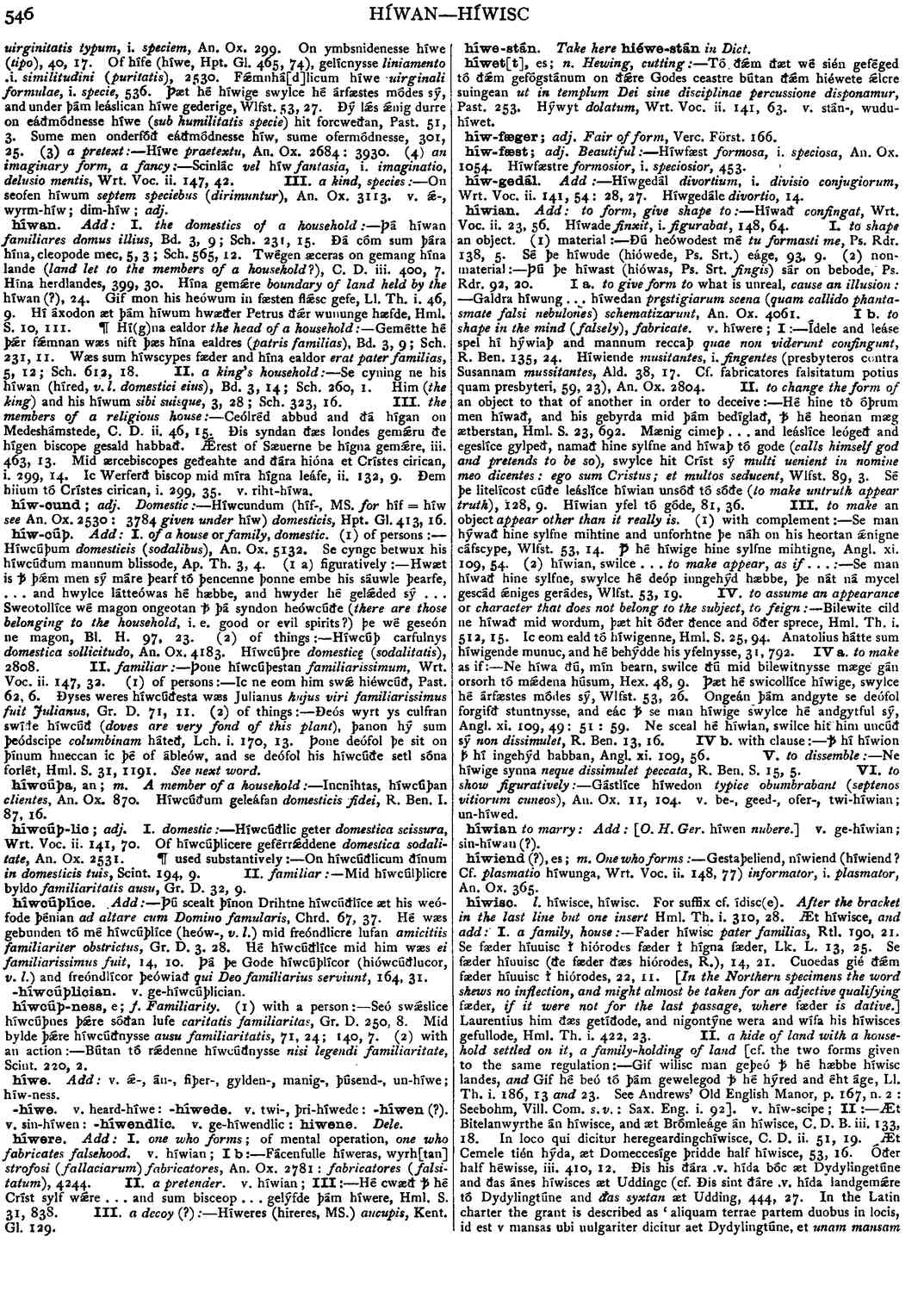híwian
- verb [ weak ]
-
Híwað
confingat,
- Wrt. Voc. ii. 23, 56 .
-
Híwade
finxit, i. figurabat,
- 148, 64 .
-
Ðú heówodest mé
tu formasti me,
- Ps. Rdr. 138, 5 .
-
Sé þe híwude (hiówede,
- Ps. Srt. )
eáge,
- 93, 9 .
-
Þú þe híwast (hiówas,
- Ps. Srt.
fingis)
sár on bebode,
- Ps. Rdr. 92, 20.
-
Galdra híwung ... híwedan
pręstigiarum scena (quam callido phantasmate falsi nebulones) schematizarunt,
- An. Ox. 4061.
-
Ídele and leáse spel hí hýwiaþ and mannum reccaþ
quae non viderunt confingunt,
- R. Ben. 135, 24 .
-
Híwiende
musitantes, i. fingentes (presbyteros contra Susannam mussitantes,
- Ald. 38, 17 .
-
Cf. fabricatores falsitatum potius quam presbyteri,
- 59, 23 ),
- An. Ox. 2804 .
-
Hé hine tó óþrum men híwað, and his gebyrda mid þám bedíglað, ꝥ hé heonan mæg ætberstan,
- Hml. S. 23, 692 .
-
Mænig cimeþ ... and leáslíce leógeð and egeslíce gylpeð, namað hine sylfne and híwaþ tó gode
(calls himself god and pretends to be so),
swylce hit Críst sý
multi uenient in nomine meo dicentes: ego sum Cristus; et multos seducent,
- Wlfst. 89, 3 .
-
Sé þe litelícost cúðe leáslíce híwian unsóð tó sóðe
(to make untruth appear truth),
- 128, 9 .
-
Híwian yfel tó góde,
- 81, 36 .
-
Se man hýwað hine sylfne mihtine and unforhtne þe náh on his heortan ǽnigne cáfscype,
- Wlfst. 53, 14.
-
ꝥ hé híwige hine sylíne mihtigne,
- Angl. xi 109, 54.
-
Se man híwað hine sylfne, swylce hé deóp inngehýd hæbbe, þe nát ná mycel gescád ǽniges gerádes,
- Wlfst. 53, 19 .
-
Bilewite cild ne híwað mid wordum, þæt hit óðer ðence and óðer sprece,
- Hml. Th. i. 512, 15 .
-
Ic eom eald tó híwigenne,
- Hml. S. 25, 94 .
-
Anatolius hátte sum híwigende munuc, and hé behýdde his yfelnysse,
- 31, 792 .
-
Ne híwa ðú, mín bearn, swilce ðú mid bilewitnysse mæge gán orsorh tó mǽdena húsum,
- Hex. 48, 9 .
-
Þæt hé swicollíce híwige, swylce hé árfæstes módes sý,
- Wlfst. 53, 26.
-
Ongeán þám andgyte se deófol forgifð stuntnysse, and eác ꝥ se man híwige swylce hé andgytful sý,
- Angl. xi. 109, 49 :
- 51 :
- 59 .
-
Ne sceal hé híwian, swilce hit him uncúð sý
non dissimulet,
- R. Ben. 13, 16 .
-
ꝥ hí híwion ꝥ hí ingehýd habban,
- Angl. xi. 109, 56.
-
Ne híwige synna
neque dissimulet peccata,
- R. Ben. S. 15, 5 .
-
Gástlíce híwedon
typice obumbrabant (septenos vitiorum cuneos),
- An. Ox. 11, 104 .
Bosworth, Joseph. “híwian.” In An Anglo-Saxon Dictionary Online, edited by Thomas Northcote Toller, Christ Sean, and Ondřej Tichy. Prague: Faculty of Arts, Charles University, 2014. https://bosworthtoller.com/52617.
Checked: 1